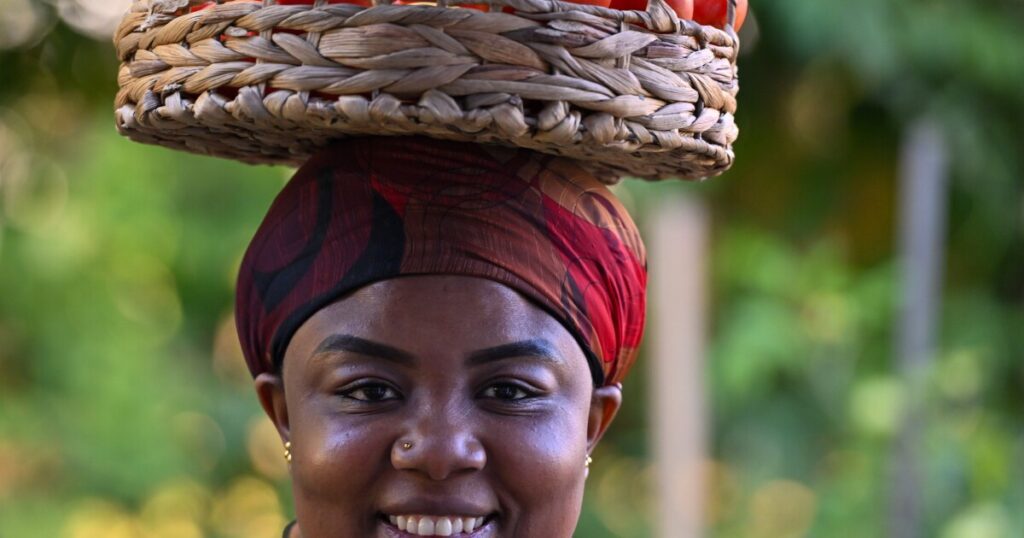Tucked away by a slope of the land off Cedar Avenue in South Scranton is a long, rectangular garden that helps feed refugee families, body and spirit, from the Democratic Republic of Congo.
“It’s just that sense of togetherness, sense of community. Having access to fresh food here is a problem. So this is just a way to try to address that problem,” said Ushu Mukelo, founder and president of the Congolese Community of Scranton.

Some corn, lots of tomatoes, squash, cabbage, carrots and green beans still grow in mid-Fall. John Mukelo, Ushu’s father, is the garden’s caretaker, and volunteers from the community also till the land.
Community advocate and businessman, Frank Dubas, lends the plot in the 900 block of Cedar to the Congolese Community. Four years ago, the younger Mukelo and Dubas were at an event together. Mukelo mentioned that the refugees who now call Scranton home were looking to grow a large garden. Dubas, who also has a community garden on Cedar, had the space. He helps the community with grants and provides them with the water to nourish the plants.
“We’re really happy about the harvest, but the families have increased,” said Mukelo.
Mukelo’s nonprofit helps makes the refugee transition process easier and works with families long term. There are now about 450 to 500 refugees from the Congo living in Scranton.
The Congo is rich with minerals. Armed groups battle over people and resources, causing widespread poverty, violence and chaos. Many of the families who now live in Scranton spent years in refugee camps across East and Southern Africa before they were admitted to the United States through the U.S. Refugee Admissions Program.
The displacement crisis in the Congo is one of the largest in the world, second only to Sudan, according to the United Nations.
Supplementing groceries
A green chair sits in a clearing in the garden. Pesky squirrels sneak through the growing plants and take nibbles of produce alongside beetles. Wooden stakes help hold up tomatoes as they grow. The garden is a green oasis between the condemned red brick Pennswood Manor Personal Care Home and a white home made up of apartments.
On a warm Friday-afternoon, a neighbor yelled out that the garden is beautiful.
Mukelo said the Congolese community is very concerned about nutrition. Access to food is a problem where they came from. In the United States, they feel people eat a lot and much of it is processed food. They worry about diabetes and cancer.
“The quality of food is something every family is really thinking so hard about,” he said.
The refugees take every job that’s available to them, which are often low paying jobs, Mukelo said. The garden helps families save money on groceries.
“You can imagine, and then a family of seven, even food stamps, SNAP benefits are not enough to run them through the whole month. So, they end up spending some of their own monies on food,” he said. “So there’s a lot of stress when it comes to financial stability for many of our families, and this is just that one piece that actually helps address that.”
A place to cultivate fresh food
Mwenebatu Mukelo is a French teacher by trade who now works in warehouses. He’s an elder in the community, which to Africans is someone over 55 who exemplifies wisdom and gives advice and helps resolve problems.
The elder Mukelo usually tends to the garden in the evenings. Families can just show up and harvest what they need.
“Sometimes they come here asking, ‘oh, we just want … some leaves of squash, or want some amaranthus.’ My father makes sure that he keeps planting more amaranthus, because it grows like in three weeks you harvest and then you plant again. It’s in high demand,” Ushu Mukelo said.
The families use the leaves as well as the ones from the vegetables, like squash. They chop them up and mix them with smoked fish or meat. They’ll also fry the leaves with onions and eat with Fufu, which is a staple African dish made with water and corn flour.
There’s nutritional and financial benefits to the garden, but also physical health benefits. Mukelo said Africans have a very strong connection to the soil and to the land.
“I think one way to connect back is having a place where we can cultivate, have fresh food, and, you know, do some work in the outside, get fresh air,” he said.
Everyone that works in the garden is a volunteer. They start planting around the end of April. With the number of families and costs increasing, Mukelo said they are looking for more land in the city.
Eventually, they’d love to give back to the community and replicate the garden all over the city.
“The elders want us to produce more food so we can actually give some to places like St. Francis of Assisi, maybe the homeless people,” he said. “We have to be able to consume, but also be able to give the surplus to other people as well. Because the point is, sharing is caring.”

